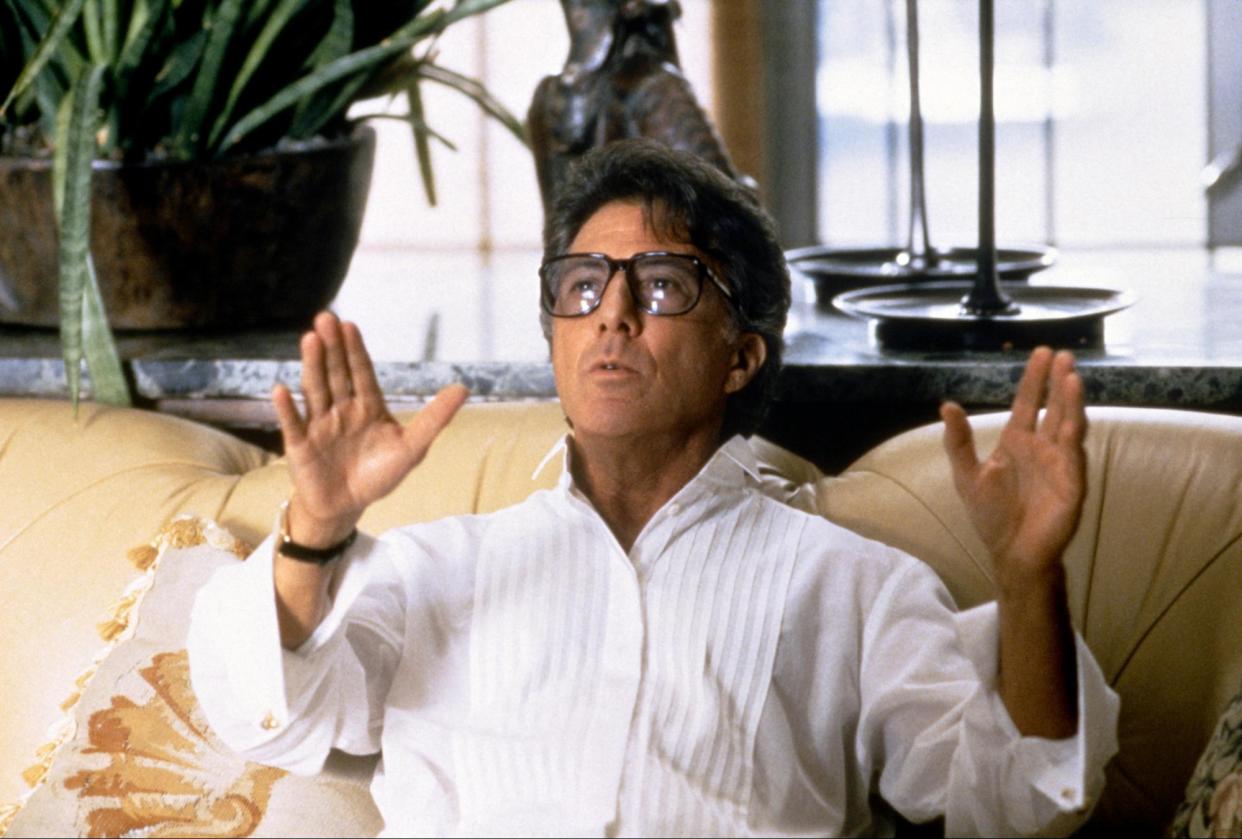Wag the Dog: a pitch-black political comedy that’s never looked more relevant

In a public discussion about the US election, the political commentator and one-time Keating speechwriter Don Watson posited that the American public finds it difficult to tell the difference between reality and fantasy. Never were the lines more blurrily drawn than in Wag the Dog, Barry Levinson’s pitch-black comedy from 1997.
According to the Merriam-Webster dictionary, the tail wagging the dog describes a situation in which “an important or powerful person, organization, etc., is being controlled by someone or something that is much less important or powerful”.
Levinson’s film depicts a mega-manipulation of political events by a spin doctor (the tail), who hires a Hollywood producer to create a fake war to divert the US public (the dog) from a sex scandal involving the president, two weeks before an election.
In a remarkable coincidence, the film was released less than a month before the Bill Clinton-Monica Lewinsky scandal broke in January 1998. Then, in August that year, just days after the president admitted to “inappropriate intimate contact” in front of a grand jury and made a televised apology to the nation, his administration launched missile strikes against Afghanistan and Sudan – effectively shifting the media focus with a barrage of dramatic footage beamed nightly into US living rooms.
Pure coincidence or a deliberate strategy to draw attention away from the bad behaviour of a sitting president? The similarities between Wag the Dog and real life did not go unnoticed.
Robert De Niro as spin doctor extraordinaire Conrad “Connie” Brean and Dustin Hoffman as film producer Stanley Motss are the inspired yin-and-yang comedic duo at the heart of this underrated political satire, leading an ensemble cast who include Anne Heche, Woody Harrelson, a teen Kirsten Dunst and an age-defying Willie Nelson.
De Niro plays Connie with a world-weary charm that belies the ruthless master manipulator beneath, while Hoffman is at his quick-fire best playing the Hollywood producer with a huge Oscars-shaped chip on his shoulder.
Motss sees his assignment as his opportunity for redemption and ultimately recognition in the eyes of Hollywood. The result is part Saving Private Ryan, part Tropic Thunder. With a small cast and crew and a truckload of CGI effects, Motss creates a fictional war with Albania, complete with footage of a decimated village and a kitten-carrying child survivor (Dunst) in the rubble.
The ante is upped and upped again, as Motss hires a Nashville folk singer (Nelson) to create a sentimental soundtrack for the war, and conjures up a brave US serviceman (Harrelson) who needs to be rescued from behind enemy lines. Somewhere along the way the CIA gets a whiff of the deception and sends an agent (William H Macy) to put a stop to it – raising the dramatic stakes.
Wag the Dog has an impeccable pedigree. Thanks to Levinson (the director of 80s hits such as Good Morning Vietnam and Rainman) and the stellar cast, a clever premise is made even funnier by rapid-fire pause-button-worthy dialogue (David Mamet was one of the screenwriters), masterfully delivered.
The film feels freshly relevant in not only an election year, but one in which misinformation, deep fakery and media distrust is rife – as seen after the July assassination attempt on Donald Trump, when conspiracy theorists on both sides of the political divide questioned what was real and what was manufactured.
Wag the Dog is particularly sharp in portraying the manipulative power of the media and the cynicism needed to make Hollywood blockbusters promoting good ol’ American values. It provides a masterclass – both sickening and salutary – in how to make a hit. In the current climate of AI and deep fakery, its message is an even more troubling one.
Wag the Dog is available on ABC iview in Australia and to rent in the US and UK. For more recommendations of what to stream in Australia, click here


